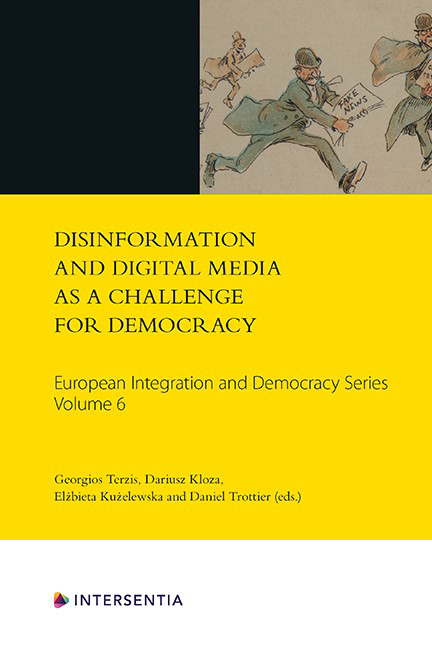Book contents
- Frontmatter
- Foreword: Fooling All of the People All of the Time: Democracy in the Age of Fake News
- Introduction: ‘They All Hear “Ping” at the Same Time’
- Contents
- List of Abbreviations
- List of Contributors
- PART I THEORETICAL APPROACHES TO AND THE CONCEPTUALISATION OF DISINFORMATION
- PART II EXPERIENCE OF DEALING WITH DISINFORMATION
- PART III SOLUTIONS TO DEAL WITH DISINFORMATION AND THEIR CRITIQUE
2 - From Misinformation to Modern Lügenpresse: The Redefinition of Fake News
Published online by Cambridge University Press: 26 May 2021
- Frontmatter
- Foreword: Fooling All of the People All of the Time: Democracy in the Age of Fake News
- Introduction: ‘They All Hear “Ping” at the Same Time’
- Contents
- List of Abbreviations
- List of Contributors
- PART I THEORETICAL APPROACHES TO AND THE CONCEPTUALISATION OF DISINFORMATION
- PART II EXPERIENCE OF DEALING WITH DISINFORMATION
- PART III SOLUTIONS TO DEAL WITH DISINFORMATION AND THEIR CRITIQUE
Summary
INTRODUCTION
Despite its relatively recent popularity, the term ‘fake news’ has been deployed in a number of ways in recent history, problematising our understanding of this seemingly simple term. Some refer to fabricated stories and disinformation on the Internet as ‘fake news’ , while others, as will be discussed in detail below, cry ‘fake news’ when they hear something in the news with which they personally disagree. The various understandings of fake news demonstrate how the term has, in the words of Johan Farkas and Jannick Schou, become a ‘floating signifier’ that is now ‘used by fundamentally different and in many ways deeply opposing political projects as a means of constructing political identities, conflicts and antagonisms’.
A concept often associated with fake news is the term ‘post-truth’. In a book published in 2017, journalist Matthew d’Ancona wrote:
To everything there is a season: 1968 marked the revolution in personal freedom and the yearning for social progress; 1989 will be remembered for the collapse of totalitarianism; and 2016 was the year that definitively launched the era of ‘Post-Truth’.
Lee McIntyre argues that ‘post-truth amounts to a form of ideological supremacy, whereby its practitioners are trying to compel someone to believe in something whether there [is] good evidence for it or not’. Noting the rapid emergence of the phrase ‘post-truth politics’ , which itself emerged in response to untruths, lies or ‘bullshit’ in political discourse, to borrow Princeton University philosopher Harry Frankfurt's more colourful term, Oxford Dictionaries selected the phrase ‘post-truth’ as its 2016 word of the year, defining it as ‘circumstances in which objective facts are less influential in shaping public opinion than appeals to emotion and personal belief’. The purposeful provocation of strong emotional responses is central to the concept of post-truth. For an increasing number of people, including politicians, only ‘facts’ that are in line with their own sense of the truth and political worldview are actually true. In other words, there is a persistent belief that facts are open to interpretation.
- Type
- Chapter
- Information
- Publisher: IntersentiaPrint publication year: 2020



